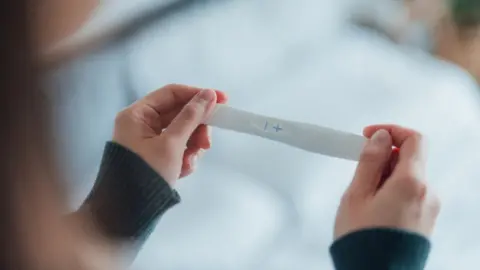Abortion: Legal challenge begins over NI abortion law
 Oscar Wong/Getty Images
Oscar Wong/Getty ImagesA challenge to the government's legal authority to establish abortion services in Northern Ireland is under way in the Court of Appeal.
The Society for the Protection of Unborn Children (Spuc) argues it should be for Stormont politicians to decide on the issue.
In February, the High Court rejected its challenge, upholding steps taken by former NI Secretary Brandon Lewis.
Then, a High Court judge ruled that Mr Lewis had been compelled to act.
Mr Justice Colton found that the secretary of state had carried out his legal obligations, after a United Nations body found the UK had breached the rights of women in Northern Ireland, by limiting access to abortions.
He said the secretary of state "remains obliged to do so where it appears to him further changes in the law of Northern Ireland are necessary or appropriate for complying with his duties".
He stated: "Only Parliament can change this."
'Blank cheque'
Anti-abortion group Spuc took its initial challenge in 2021, after Mr Lewis, who was then secretary of state, directed Stormont's Department of Health to commission full abortion services by March 2022.
When this did not happen, Mr Lewis intervened further and in May this year took additional powers allowing the Northern Ireland Office (NIO) to bypass the Department of Health in Northern Ireland and move to establish services.
His successor, Chris Heaton-Harris, has said he remains committed to putting the services in place.
In the opening of his challenge on Tuesday, John Larkin KC questioned the basis for the government's actions in legislating for abortion during the absence of devolution.
He said: "Did Parliament write a blank cheque?"
He asked whether the regulations were "designed to replace devolution or work with devolution and respect devolution", saying the Court of Appeal will have to determine whether the secretary of state "exceeded powers" provided to him.
During submissions a comparison was drawn between other provisions within the act in a bid to demonstrate constraints on the secretary of state.
Lady Chief Justice Dame Siobhan Keegan adjourned proceedings after a barrister for the secretary of state requested additional time to assess this argument.
She said: "It is very regrettable that we do that, but we need to get this case fully and properly argued to allow us to decide on it."
How did we get here?
In 2019, MPs passed legislation to decriminalise abortion.
Abortion is a devolved matter, but at that time devolution in Northern Ireland was suspended due to a political row.
The legislation passed by Westminster also put the onus on the government to draw up a new framework for abortions to be carried out in Northern Ireland in a range of circumstances.
A model to operate across Northern Ireland has yet to be put in place.
The High Court has already held in a separate case brought by the NI Human Rights Commission that the secretary of state failed in his legal duty to "expeditiously" provide women with access to full services.
